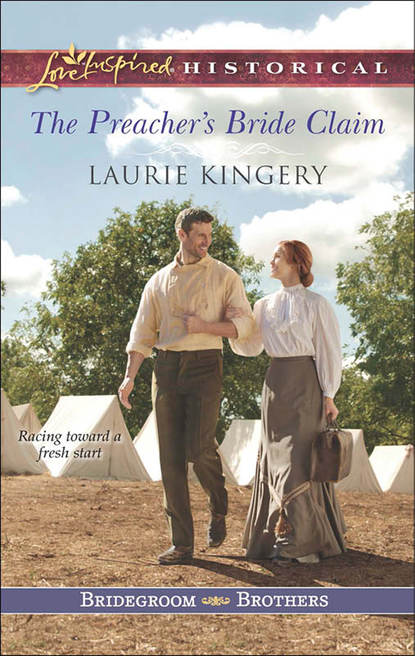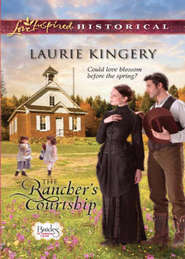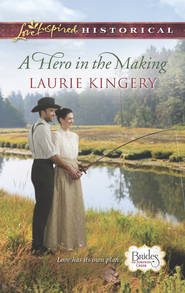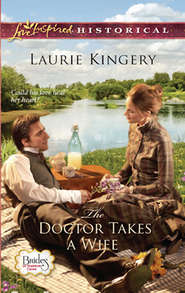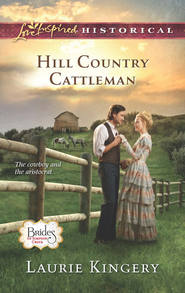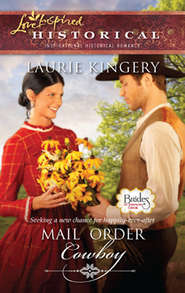По всем вопросам обращайтесь на: info@litportal.ru
(©) 2003-2024.
✖
The Preacher's Bride Claim
Настройки чтения
Размер шрифта
Высота строк
Поля
“Thank God you found her,” he said, spotting Alice and the preacher. “It don’t seem like my Nate’s ever gonna stop throwin’ up. I’m Jeremiah Kindell, miss, and I sure hope you can help him, like I hear you done with Keith Gilbert last night.”
“I’ll be happy to do what I can,” she murmured, touched by the man’s faith in her.
“Please, come inside,” he said, lifting the tent flap. “My wife’s in there with him.”
As Alice’s eyes adjusted to the dim light within the tent, she saw not only a wife and child within, but three other children, as well, all wide-eyed and fearful. She gave them an encouraging smile before focusing on the boy lying on a sheet in the middle of the tent, his head cradled in a worried-looking woman’s lap.
The boy looked to be about seven or eight, and was pallid except for a spot of hectic color along each cheek. Alice could see pearls of sweat beaded on his forehead and damp hair plastered down at the edges. A cloth-covered bowl lay near his head, evidently at the ready in case he vomited again.
“What can you tell me about your son’s illness, Mrs. Kindell?”
“We had this sack a’ green apples I was gonna make into a pie, and Nate got into ’em when I wasn’t lookin’. He musta et six of ’em at least afore I noticed,” the tired-looking woman said. “Since then he’s been crampin’ and heavin’ ever’ few minutes, since last night.”
Alice breathed an inward sigh of relief. A simple case of green-apple stomachache, a common ailment in active, ever-hungry boys. Nature would take its course and ease his symptoms in time. “I’m sure I can help him feel better,” she said, and reached into her bag. “Do you have a pot I could use to make a tea for him to sip?”
After the woman rose and fetched one, Alice mixed ground ginger root, allspice, cinnamon and cloves, poured in some water fetched by the boy’s father and encouraged the wan-looking boy to sip some.
“Give him a sip or two every few minutes,” she advised the mother. “He’ll feel better in a while, though he might have to visit the privy soon.”
“Thank you so much,” Mrs. Kindell breathed. “God bless you, Miss Hawthorne—”
“Hey, is that nurse still in there?” a man’s voice called from outside the tent. “I got me this boil...”
And so it went. Word had spread that a nurse was seeing those with ailments over at the Kindells’ tent, and before the afternoon was over, she had lanced the man’s boil, seen a young man with quinsy throat, salved and bandaged a burn, treated a case of catarrh and pried a splinter out of a finger. And the afternoon was gone.
“I fear my simple request has ended up consuming the rest of your day, Miss Hawthorne,” Elijah said after the patients finally stopped coming.
“That’s all right,” she told him, realizing that the time had seemed to fly for her because she’d felt productive and useful. “The only plan I had today was to look at horses. We’re all of us just waiting for the twenty-second, aren’t we?”
He nodded in acknowledgment. “You’re a good and generous woman.”
Her stomach rumbled just then, reminding her that she had never been able to start simmering the beef bone and the rest of the ingredients for her supper stew.
She wasn’t sure if Elijah had heard it, but he said, “Why don’t you join my brothers and me for supper? We usually go to Mrs. Murphy’s tent. It’ll be our treat. You can tell Gideon what you’re looking for in a horse,” he added, just as she opened her mouth to say she appreciated the invitation, but it wasn’t necessary.
The truth was, it was so late in the day that she’d have to go to one of the supper tents, too, so she might as well accept. She did need a horse, after all, so it wouldn’t look as if she was merely loathe to part with the preacher. The truth was, though, she had enjoyed Elijah’s company and support this afternoon.
* * *
“No, you sure don’t want a Thoroughbred for the run, Miss Hawthorne. Glad you didn’t buy one,” Gideon said, as the four of them sat at the end of one of the many long tables in Mrs. Murphy’s tent restaurant. The place was full, so they were lucky to get enough space to eat together. The beef was—as the brothers had promised her—tough, but the buttered boiled potatoes, with yeast rolls and green beans, more than made up for it.
“Oh, there was no danger of me spending that much money on a horse,” Alice assured Elijah’s brother. “Not at the price they were asking. But why is a Thoroughbred a bad idea? They’re faster than the average mount, aren’t they?”
“For the first mile or so, sure—they’ll leave all the other horses in the dust. But unless you’re wantin’ a claim just over the line, they can’t keep up that speed. They’ll be played out after that second mile. You want a horse with endurance, ma’am.”
“Could you help her find one at a reasonable price, Gideon?” Elijah asked.
“I was already planning to.”
“Is it possible to buy one that isn’t still half-wild?” Alice asked, remembering the wild-eyed mustangs in the first horse trader’s corral. “I don’t think it would be wise to be struggling with a green-broke horse on the day of the run.”
“I’ll find you a good one, don’t you fret, Miss Hawthorne,” Gideon assured her.
“I think it’s time you gentlemen called me Miss Alice,” she said, and realized she was enjoying herself. It was so much more fun to eat supper with others.
“Then we’re Elijah, Gideon and Clint. Have you ridden much before?” asked Elijah.
“I could give you lessons,” offered Clint.
Alice laughed. It felt good to laugh, and she realized she hadn’t done so in a long, long time. She felt she could relax and let down her guard somewhat around these men, and appreciate having friends. When one considered that they would all be competing for land, it was really quite amazing that everyone was so helpful.
“Bless you, but I grew up on a farm,” she said. “I mostly rode bareback on our plow horses, though my mother said it wasn’t ladylike. Goodness, that’s been ages ago.” It had been a decade or more since Hawthorne Farm had been a thriving, prosperous place, too, she thought, remembering how it had looked when she had come back as her father lay dying, had seen how the farm had fallen apart during his long illness, with all the good stock sold off to pay the doctor’s bills and keep up the mortgage.
From there Alice steered the topic of conversation back to the brothers. She knew Elijah’s goal in coming to Oklahoma was, of course, to build a church, but through skillful questions, she learned that Gideon wanted to start a horse ranch—not a big surprise, since Elijah had asked him to obtain a horse for her—and Clint hoped to be a town sheriff, as well as a homesteader.
None of these men were married, she mused. Why? Making a home out of nothing was hard without a wife to do the cooking and laundry while the husband tamed the land. And didn’t any of them want children to pass the land on to? It was especially unusual for Elijah, a preacher, to be a bachelor. Every preacher she’d ever met before had had a wife and a handful of children.
It wasn’t impossible that one or more of the brothers had been widowed, perhaps lost a wife in childbirth. Such things happened all too often. But perhaps the brothers were waiting till they were settled to go courting. It was none of her business, she reminded herself. She wasn’t about to ask them about that area of their lives, for it might lead to similar questions aimed at her.
“Well, I suppose I’d better walk you over to the Gilberts’ camp before it gets too much later,” Elijah said to Alice, rising from his bench across from her.
She took a quick look at the watch she wore on her bodice. “Goodness! I hadn’t realized so much time had passed,” she said. It was the first evening that she hadn’t watched the minute and hour hands crawl around the circle of her watch face with agonizing slowness until it was time to blow out her lantern. “Thank you, gentlemen, for supper and a most pleasant evening.”
“It was our pleasure, ma’am,” Clint said, sketching a bow. “Anytime you want company at supper, you can generally find us here of an evening.”
Just as they were about to go their separate ways at the entrance to Mrs. Murphy’s tent, a pair of men roughly shouldered past them, one of them clipping Clint’s shoulder, then striding on as if unaware of the contact, but it had obviously been on purpose.
“Whoo-eee. Good thing they’re leavin’,” Alice heard one of them mutter. “I never did cotton to dinin’ with snakes and traitors.”
Clint pivoted and lunged in their direction, but Elijah reached out and restrained Clint with a quick hand on his arm.
“I know how you feel, but it’s not worth it, Clint,” Elijah said in a low, urgent voice.
“Yeah, they’re not worth bruising our knuckles on—or getting ourselves thrown out of Mrs. Murphy’s,” Gideon growled, staring after the two men, his face as resentful as Clint’s. “Reckon the troublemaking Chaucers have been talking again.”
Clint shook off Elijah’s hand, but Clint didn’t follow after Elijah; Gideon standing still, too. “Lije, we’ll meet you back at the tent.” When Elijah gave Clint a searching look, he said, “Don’t worry. We’re not going back in there. I’m not going to do anything stupid. Night, Miss Alice.”
Left alone with Elijah, Alice didn’t know what to say. Her heart went out to the Thornton brothers, even though she didn’t fully understand the reason for the hostility being shown to them.
Elijah sighed. “I feel I owe you an explanation, now that you’ve been witness to this sort of thing on two different occasions,” he said. “Come. I’ll explain as we walk.”
“Please don’t feel you must—it’s none of my business,” Alice murmured as she fell into step with him.
“Perhaps it’s best if you know,” Elijah said. “As Mr. LeMaster hinted at the other day, the Thorntons and the Chaucers both grew up on plantations in Virginia before the war. The Chaucer children were our closest friends.”
“I see,” she murmured. So that was the source of the drawl that occasionally crept into Elijah’s otherwise Yankee voice.
“We spent the war years in Pennsylvania with a cousin of Papa’s, while he went to fight for the Union. The plantation was left in the care of an overseer. Because of our father’s loyalty to the Union, we kept possession of our plantation after the war, while our former friends, the Chaucers, lost theirs to taxes. But they made sure we were no longer welcome there,” he said, bitterness edging into his voice, “so we sold Thornton Hall and moved to Kansas. We’d hoped to leave the past behind when we came to Oklahoma....” He sighed again and looked off into the distance.





